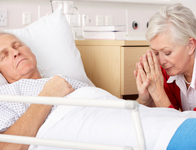HEALTH professionals involved in end-of-life care can contribute positively to their patients’ spiritual wellbeing with the right training and skills, say two leading Australian experts.
Professor Patsy Yates, president of Palliative Care Australia told MJA InSight that conversations with dying patients about continuing treatment required high-level skills from attending medical teams.
Professor Ian Olver, president of the Cancer Council and author of the book Investigating prayer: impact on health and quality of life, agreed that doctors needed more education in this area.
They were responding to research, published in JAMA Internal Medicine, on the provision of spiritual support to patients with advanced cancer. It found terminally ill patients receiving a high level of spiritual support from religious communities were more likely to receive more intensive end-of-life (EoL) medical care, including less palliative care, more aggressive interventions, and were more likely to die in the intensive care unit. (1)
However, the researchers wrote that when medical teams provided spiritual care and EoL discussions with these patients there was a reduced intensity of medical care near death.
The multisite cohort study of 343 patients involved baseline interviews to assess support by religious communities of patients’ spiritual needs. EoL quality of life was assessed by caregiver ratings in the final week of life.
“Spiritual care and EoL discussions by the medical team may reduce aggressive treatment, highlighting spiritual care as a key component of EoL medical care guidelines”, the authors wrote.
Professor Yates said organised religious community support provided practical support that the health care system often neglected and that it could have benefits at times other than EoL.
“People’s spiritual needs change over time, that’s part of being human”, Professor Yates told MJA InSight.
“A woman with a life-limiting illness said [at a recent conference] that just having that conversation about end-of-life care with her doctors has given her so much peace.
“The challenge for health care professionals is the timing of that conversation. Patients might not be ready to have it. The skill of the health care professional is to introduce that conversation to patients at the right time — that is a very high-level skill.”
Professor Yates said while medical students did receive some education about spiritual care it was usually part of overall communication skills training.
“There is a need for it not to be so hidden, to help us understand meaning and how it changes for patients”, she said.
“If we’re person-centred about our approach to end-of-life care and continuing treatment then the [personal beliefs of individuals] shouldn’t really matter.”
Professor Olver told MJA InSight doctors needed to communicate accurately about EoL issues to patients.
“The real message from this research is that the medical staff’s communications about what is futile treatment and what has a chance — that is a very important discussion.
“Patients tend to only accept aggressive treatment if they are given the impression that there’s a chance of it working”, Professor Olver said.
“Religious support might convince you to pursue more aggressive treatment that doesn’t give you quality of life.
“The principal medical team has a role to play in improving end-of-life quality of life because, depending on how you frame that conversation, people will make choices based on that.”
An accompanying editorial in JAMA Internal Medicine said future research would benefit from a greater focus on clarifying ambiguities left by the available data. The authors said the narrow scope of the current research meant that conclusions drawn from the results “should be more cautious”. (2)
1. JAMA Intern Med 2013: Online 6 May
2. JAMA Intern Med 2013: Online 6 May

 more_vert
more_vert
Working as a nurse for many years, nursing EOL patients I found that a spiritual word or two with the patient is extremely important to give them strength and absolute peace as they leave this world.
I have seen with my own eyes unexplained miracles happen during their passing or after they have passed away. Not all were religious, but at the very end everyone wants to believe it isn’t the end and they need someone to console them in this direction. It doesn’t take much, just a sentence, a verse read from a bible or a loving word or two while maybe holding their hand.
I would love to see more nurses and medical staff feeling comfortable in doing this with all EOL patients, as it could be the difference between a very cold, lonely death or a glorious experience for the person and their families.
This programme has been specifically designed to help medical staff become comfortable with the spiritual care of patients, as well as their own self care.
http://www.spcare.org/
it would be wonderful if all trainee doctors and nurses and other health workers and volunteers could receive this training.